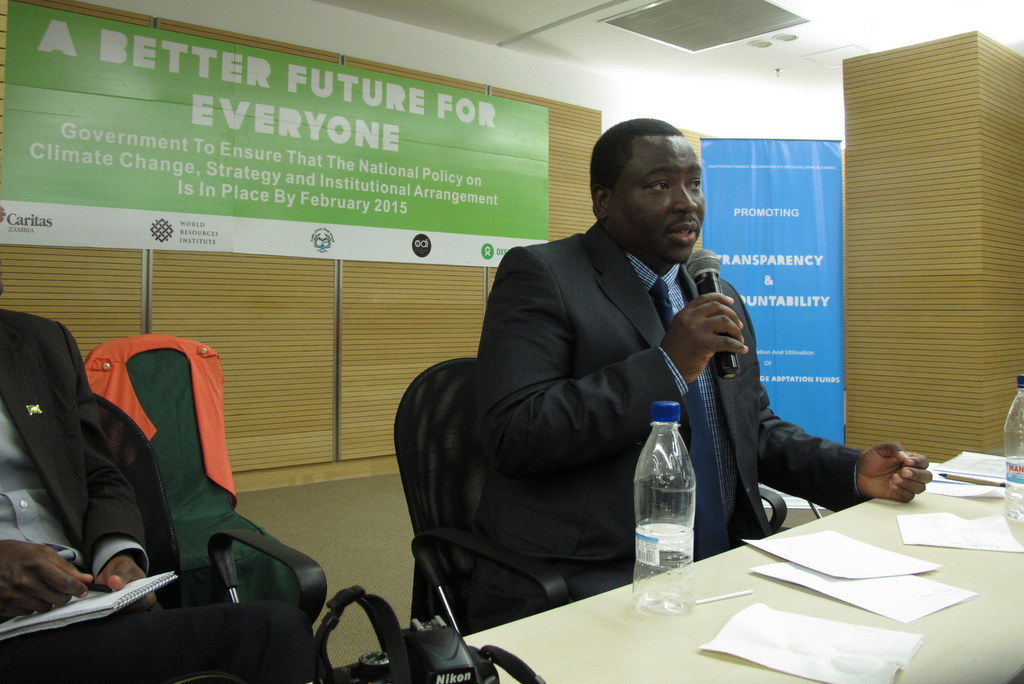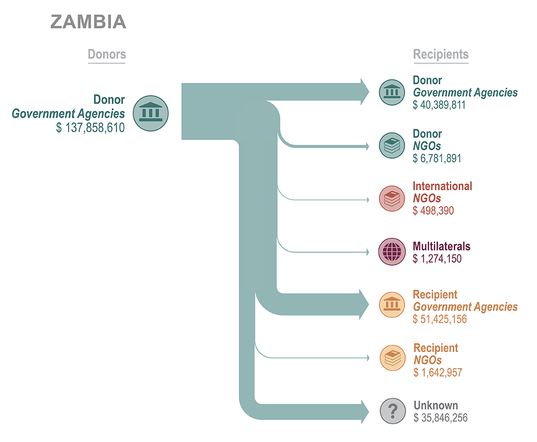Channeling climate adaptation funds to the local level: Zambia’s opportunities and challenges
 Farmer Mufungulwa Kalunga speaks to his fellow farmers about his farming practices during a field day in Mongu, Zambia, sponsored by Concern Worldwide. Helping small-scale farmers adopt agricultural practices that will buffer them from the harmful effects of climate change must be a priority in Zambia. Photo: http://bit.ly/1t3faBz
Farmer Mufungulwa Kalunga speaks to his fellow farmers about his farming practices during a field day in Mongu, Zambia, sponsored by Concern Worldwide. Helping small-scale farmers adopt agricultural practices that will buffer them from the harmful effects of climate change must be a priority in Zambia. Photo: http://bit.ly/1t3faBz
A national symposium in Lusaka takes a look at where the finances are flowing.
Annaka Peterson Carvalho is the Senior Program Officer of the Adaptation Finance Accountability Initiative, led by the World Resources Institute, Overseas Development Institute, and Oxfam.
“[We] need to get down to business and work with local communities,” said the Vice President of Zambia, Guy Scott, in his opening remarks at the National Symposium on Climate Change Adaptation Finance, Governance & Accountability in Lusaka on Tuesday. Organized by the Zambia Climate Change Network and Oxfam, the symposium brought together stakeholders from government, international organizations, and civil society to discuss findings from research tracking adaptation finance flows in Zambia.
But what are the barriers to actually making use of adaptation finance to build the resilience of local communities?

Increasingly donors are reporting that they are providing funds for climate adaptation, but much of this funding is going to projects that aren’t really about local adaptation. In the end they will say that they provided Zambia with funding for adaptation, but will this have led to greater resilience of communities?
Zambia is not alone in this challenge. Many governments in poorer countries find it difficult to mainstream national and external funding for adaptation into their national development planning. Climate change is a relatively new development issue, so many of the activities have been focused at the national level, but as greater emphasis is placed upon mainstreaming climate adaptation into development planning, it will be essential to uphold country ownership, improve coordination, and most importantly, engage local communities in the decisions that affect their lives.

The Zambian government has taken a number of important steps to address climate issues and has prioritized climate change adaptation. It established the Climate Change Secretariat, which carried out a lot of preparatory work with communities and the Ministries in order to prepare for implementation of adaptation activities.
When it comes to channeling adaptation resources to the local level to help communities, the Adaptation Finance Accountability Initiative in Zambia identified the following challenges that will need to be addressed:
- There is a huge variance between pledged and disbursed funds. From 2012 to 2013, only 36% of committed adaptation funds were disbursed by donors.

Noah Zimba of the Zambia Climate Change Network presents the Adaptation Finance Accountability Initiative findings. Photo: Angelo Kairos Torres Dela Cruz / Institute for Climate and Sustainable Cities - Stakeholders at district and community level were not involved in any of the key stages of the planning and budgeting process.
- Resources were allocated by the government at national level without stakeholder and community input, resulting in a mismatch between what the government does and what the people see as their main priorities.
- Local communities in Zambia had limited awareness about available climate finance and their own rights and responsibilities, making it difficult for them to actively claim their rights and demand greater accountability.
- Climate change adaptation has yet to attain the level of prioritization throughout the government that would contribute to greater domestic flows for adaptation.
Most of Zambia’s funding for adaptation comes from outside Zambia. Nellie Nyangwa, the Oxfam Country Director, said the Zambian government is in a good position to own adaptation and ensure resources are allocated to local communities. Zambian leaders can do a lot to access and utilize more funds to build the resilience of local communities. However, there is still a lot of work ahead to further engage and listen to citizens and communities who are most directly affected by the impacts of climate change. Ensuring that their needs are met must come first.